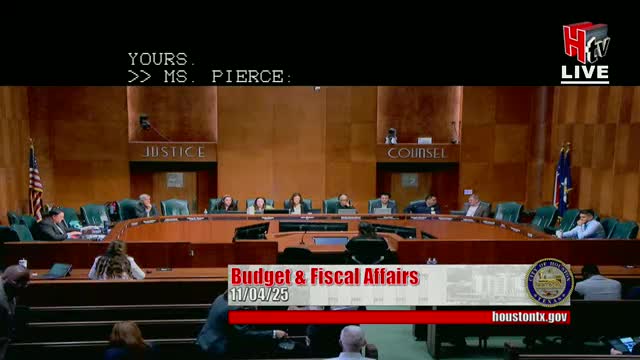Audit finds weak controls on city fuel cards; audit team recommends monthly reconciliations, PIN/odometer checks and Samsara telematics integration
Get AI-powered insights, summaries, and transcripts
Subscribe
Summary
An internal audit found systemic control weaknesses in the city's fuel‑card program, including thousands of commercial transactions near city fuel islands, hundreds of cards assigned to vehicles not in the official fleet and little evidence of monthly reconciliation by departments. Auditors recommended near‑term fixes and said an ongoing Samsara
A city audit presented to the Budget & Fiscal Affairs Committee found significant control weaknesses in the city's fuel‑card program and recommended a series of administrative and technical fixes the department has already begun to implement.
The audit team reported the city's annual commercial fuel‑card spend averaged about $5.1 million for fiscal years 2023 and 2024 and that there were 1,286 active fuel cards in fiscal 2024. The audit identified 11 findings, three of which auditors rated critical. Key findings included:
- High volume of commercial fueling near city pumps: Roughly $3.5 million of commercial‑card transactions in FY24 occurred within three miles of a city‑owned fuel island; about $740,000 of that amount occurred during normal business hours when city pumps should generally be used under administrative policy, and roughly $2.8 million occurred after hours or on weekends (allowed by policy in many cases).
- Unsupported card assignments: More than 300 fuel cards were assigned to vehicles that did not appear in the official fleet management system; transactions on those cards totaled more than $550,000 in FY24. Some of the vehicles were listed as sold or retired in separate vendor lists, indicating a breakdown in deactivation processes.
- Missing departmental monitoring: The audit found 91% of monthly fuel‑card statements had no documented reconciliation or review by the responsible departments.
The audit recommended a set of near‑term and programmatic actions: enforce monthly statement review and certification by departments; retain supporting fuel‑purchase documentation by billing cycle; perform quarterly sweeps to deactivate cards tied to retired or inactive vehicles; require approved request forms for card issuance; keep vehicle‑card rosters synchronized across systems; segregate card administration from card usage; require employee PINs and odometer entry on commercial transactions (Voyager configuration); restrict premium fuel grades unless a vehicle specification requires them; and provide annual training and sanctions for noncompliance.
Deputy Director (audit presenter) told council staff that several of the recommendations are already underway and that the Fleet Management Division has deployed enhanced analytic capability and plans to integrate the Samsara telematics system to automatically capture vehicle location and mileage at the time of fueling. Director Gary Glasscock said Samsara's integration will provide the automated mileage and vehicle‑location data needed to reconcile commercial transactions with assigned vehicles and help flag exceptions for review. Staff estimated implementation of Samsara controls next summer.
Auditors said improved custody controls for unassigned cards (secure storage and access logs) would also be a low‑cost, high‑impact fix. The audit team recommended that public‑safety departments retain flexibility for round‑the‑clock operations while tightening controls and documentation to reduce avoidable costs and opportunities for misuse.
